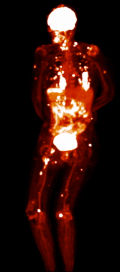 Notwithstanding the remarkable clinical success of mAb-based treatment regimens, not all patients benefit from them. This can be attributed, at least in part, to the complexity of the tumour microenvironment and its considerable heterogeneity both in terms of the tumour and non-tumour cell components. These phenomena represent a huge challenge in identifying predictive biomarkers and stratifying patient populations for personalised therapy approaches.
Notwithstanding the remarkable clinical success of mAb-based treatment regimens, not all patients benefit from them. This can be attributed, at least in part, to the complexity of the tumour microenvironment and its considerable heterogeneity both in terms of the tumour and non-tumour cell components. These phenomena represent a huge challenge in identifying predictive biomarkers and stratifying patient populations for personalised therapy approaches.
Therefore, there is an urgent need to develop assays that will help in three ways:
- accurate patient selection
- understanding intrinsic resistance mechanisms or the emergence of acquired resistance following treatment initiation and
- choosing the most effective combination regimen in circumstances in which single-agent therapies are insufficiently effective.
Currently, the baseline expression level of antigens targeted by therapeutic mAbs can be analysed by methods such as: immunohistochemistry (IHC), flow cytometry, proteomics, or next-generation sequencing of tumour tissues acquired at diagnostic biopsy or intra-operatively. These techniques aid our understanding of how cancer cells adapt to treatment and become resistant, but such methods are inherently invasive, prone to sampling errors caused by inter- and intra-tumour heterogeneity of receptor expression within analysed biopsy specimens and do not lend themselves readily to repeated sampling.
Positron emission tomography (PET), using radiolabelled mAbs, antibody fragments or engineered protein scaffolds (immuno-PET), has the potential to acquire information non-invasively and can be highly complementary to analyses based on tissue acquisition. Accordingly, immuno-PET agents might accurately identify the presence and accessibility of the target and provide a rapid assessment of tumour response to a variety of treatments in a timely fashion (e.g. within 1-2 weeks of treatment initiation). Furthermore, immuno-PET agents can provide information about the heterogeneity of both target expression and therapeutic response, which are increasingly recognised as key factors in treatment resistance. This especially relates to patients with advanced disease in whom target expression may vary from site to site and a biopsy of a single local or metastatic deposit may not accurately reflect the situation across the entire disease burden. Although introduction of immuno-PET into routine clinical practice may add complexity and increase costs, with appropriate use this imaging modality has the potential to identify patients likely to benefit from therapy and assess the efficacy of novel target-specific drugs.
Against this background, our research focuses on the development and characterisation of targeted-PET radiotracers, including protein-based theranostic agents that enable smart monitoring of immunotherapies and expand opportunities for personalised medicine approaches.